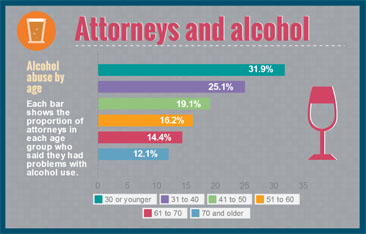Mental health crises plague attorneys along with alcohol
abuse, study says
By Psyche Pascual
Staff Writer

A far-reaching study conducted by the Hazelden Betty Ford
Foundation and the American Bar Association indicates that as many as one out
of three lawyers is a problem drinker and one out of four has some form of
depression or anxiety.
See a larger graphic with more information.
The study released last month in the Journal of Addiction
Medicine posed a series questions about alcohol use to the 12,825 lawyers who
participated in a national survey. Among those who answered the first three
questions in the alcohol survey, 36.4 percent showed signs of alcohol abuse or
dependence. Of those who answered all 10 questions, about 21 percent reported problems
with alcohol. At least one out of four attorneys also reported some form of
depression, anxiety or stress, according
to the study.
The research was released in a report titled, “The Prevalence of Substance
Use and Other Mental Health Concerns Among American Attorneys.” It was funded
by the ABA Commission on Lawyer Assistance Programs
and the Hazelden Betty Ford Foundation.
Patrick R. Krill, a study co-author, attorney and director
of Hazelden’s Legal Professionals Program, called the results “alarming,” highlighting
problem drinking among attorneys at rates much higher than for other professions
and even the general population.
“It’s so alarming because it paints a picture of a
profession that is very unhealthy in terms of behavior,” he said. Attorneys are
“trusted with people’s fortunes, people’s rights and with people’s lives. And
if between one in five or one in three have an alcohol use disorder, the public
is not being protected.”
Members of bar
associations in 19 states, including California, participated in the study. Krill
said he will present his findings at the State Bar of California’s Annual
Meeting in October.
The study points to a widespread problem that affects all
geographic regions and practice settings. But Krill said the reports of problem
drinking were higher among attorneys at private firms.
“You have this culture that’s permissive, if not encouraging
of heavy drinking,” Krill said. “A lot of firms haven’t taken proactive steps
to redress these issues.”
There’s a growing impetus at the State Bar of California to
help attorneys cope with the stresses of the job. First launched in 2002, the
bar’s Lawyer
Assistance Program helps attorneys cope with mental health and substance
abuse problems by offering counseling and career help. In 2015, a one-hour Minimum Continuing
Legal Education requirement was expanded from just substance abuse to
include “competence,” a broader set of issues which include mental and physical
health issues as well as alcohol or substance abuse.
Also last year, the LAP and the California Young Lawyers
Association launched the Early
Career Support program to help young lawyers and those with only a few
years of experience cope with career issues, such as finding a job and
developing legal skills.
The State Bar of California’s LAP Director Richard Carlton said
he was just as concerned about the high rates of depression, stress and anxiety
reported in the study as the data on alcohol abuse. About half of the attorneys
who use the State Bar’s LAP have problems with both alcohol abuse and mental
health issues, he said.
The study underscored high rates of alcohol abuse among
young attorneys with only a few years of practice. Almost 32 percent of
attorneys 30 and younger were classified as problem drinkers. Those with less
than 10 years of experience in law also had the highest rate of problems with
alcohol, about one out of four or 28.1 percent.
Carlton said those figures were a surprise. “I didn’t
anticipate that the numbers for people in the first 10 years of practice would
be significantly higher,” he said. “There’s so many of them that are struggling.”
About 53 percent
of the study participants were men, while just over 46 percent were women.
Overall, more men than women also reported problems with alcohol abuse than
women, 25.1 percent of men compared with 15.5 percent of women. At the State
Bar’s LAP, more women seek help for their problems than men, Carlton noted.
Krill notes that many attorneys still fear seeking help for
mental or alcohol abuse issues because of the impact that revealing their
problems may have for their careers. That’s why lawyer assistance programs,
human resource departments and therapists need to reassure attorneys they won’t
be stigmatized for getting help, Krill said.
“There’s a lot of bad news in our study findings,” he
admitted. “But this is also an opportunity for our profession to make some
changes and really deliver better services to our clients.”